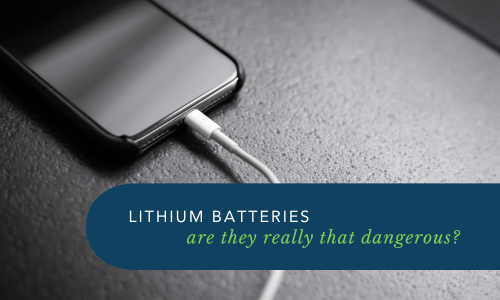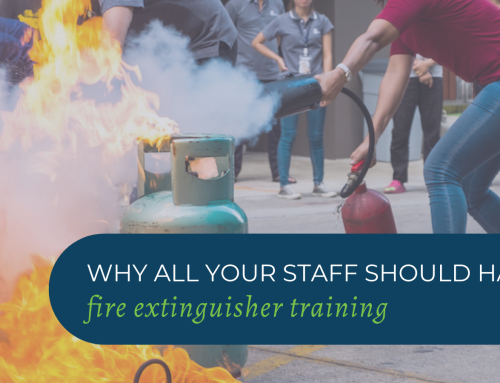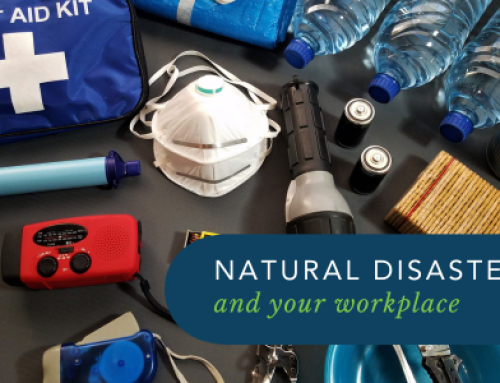We are sure you’re hearing all sorts of stories all over the news of lithium batteries exploding or creating fires. Now is this true? Should we be worried about all the lithium batteries in our lives or is this just a new media craze?
What is a Lithium Battery?
Lithium-ion batteries are a type of rechargeable battery. Lithium-ion batteries are the most common batteries used in rechargeable devices. This is due to their small size and weight, high energy density, and better power capability than other battery types.
We use lithium batteries in almost all our important everyday items now like phones, laptops, e-scooters, power tools, vapes, and the list goes on.
Although it is extremely unlikely that your lithium batteries will fail and burst into flames it is important to understand the warning signs and understand how to properly dispose of them.
Lithium Fires
Lithium fires are extremely dangerous and hard to control. Lithium-ion batteries are highly energy-dense and contain highly flammable electrolytes.
Fires can be triggered by overcharging, overheating or exposure to extreme temperatures, mistreatment, short-circuiting, battery cell defects, and aging.
WARNING SIGNS
Below you will find some of the warning signs to look out for in a device or battery:
- Pungent odors
- Discoloration, blistering, bulging, or swelling of the casing
- Leaking electrolyte
- Heating up and feeling extremely hot to touch
- Abnormal popping, hissing, or crackling sounds, smoke, and fumes
IF YOU NOTICE WARNING SIGNS DO THE FOLLOWING:
- Call 000.
- Stop charging. If safe to do so, use something as non-flammable as possible to hold it while you unplug it.
- Remove the battery or device from the inside location and place it outside in the open air, away from anything flammable.
- A Dry Powder (ABE or Carbon Dioxide (CO2) extinguisher can be used on a lithium battery fire, you don’t need a lithium-specific extinguisher.
- If you have a fire blanket, place it over the battery or device, if safe to do so.
- If the battery catches alight get yourself a safe distance away.
What NOT To Do With Your Lithium Batteries
- Never charge a battery in full sun or on a warm surface!
- Never charge a battery immediately after heavy use—allow it to cool before charging.
- Never charge a battery that has been compromised in any way, through mechanical damage, water ingress etc. Damaged batteries are prone to failure with little warning.
- Never touch a swollen or ruptured device or battery with bare hands as the heat and/or chemicals can cause severe burns!
How to Properly Dispose of Lithium Batteries
When it is time to dispose of your lithium battery it is super important it is done correctly!
The main rule for safely disposing of lithium batteries is to NOT throw them into your regular waste bin. These batteries contain chemicals that contaminate our waste streams, pollute the environment, and can cause catastrophic fires.
A big issue with these batteries is that they cause fires during transport or at the landfill when compacted in a garbage truck.
To recycle lithium batteries, you need to gather and separate the batteries for recycling. From there, you can either take your batteries to a recycling yard that accepts them or call to organise a collection. Remove the battery from the device if possible and store batteries in a cool, dry place before they are collected.
F-500 Fire Extinguisher – An Extinguisher for Lithium Fires
The F-500 is a new extinguisher that was created to battle lithium fires. The F-500 Li-Ion solution particles within the mist penetrate the surface of the burning fuel to quickly remove the heat and stop the reaction of the electrode material with other components of the battery, bringing the fire under control.
This extinguisher can be used on Class A- Common Solids, Class B- Flammable Liquids, and Class F- Cooking Oils & Fats.
This extinguisher cannot be used on Class E- Electrical fires.
It is important to note that you don’t have to have this specific extinguisher to put out a lithium fire, a Dry Chemical (ABE) extinguisher will also do the trick.
Workplace Emergency Management is equipped with friendly and qualified consultants who specialize in safety management.
Our team can provide a simple and cost-effective means to ensure your Emergency Plans are compliant and simple to follow. When providing training, our consultants know how to keep people engaged during our interactive and entertaining training sessions.
Get in touch today and we can create a lithium battery safety training for you and your team!
GET IN TOUCH
Are you ready for peace of mind that your workforce is as safe and prepared as possible?
With a dedicated team of staff ready to help you meet compliance requirements and improve the overall safety of your workplace, all you need to do is get in touch.
Request your free audit today!



